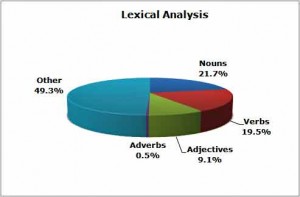It seems that many of the writers who provided the Guardian’s Top Tens share the hatred of the poor old descriptive adverb that is also drilled into students on creative writing classes. (Looking at my Oxford A-Z of grammar I was surprised to see that many of the functional pieces of English Language are classified in the adverb family — such as conjuncts, disjuncts, places and times. I don’t think even Elmore Leonard could do without those.)
I agree it’s often the refuge of writers who are trying too hard or are perhaps writing too quickly to think of a better verb (e.g. ‘walked quickly’ rather than ‘rushed’ or ‘dashed’ or ‘ran’ or ‘skipped’ or various other phrases). However, they have been around in the English Language since before Shakespeare (who wasn’t afraid of throwing a few adverbs into his own works himself). I guess it’s because many adverbs are quite lazy modifications of other types of word that they tend to jar but I don’t think a writer can really banish all instances of words like ‘quietly’, ‘deeply’ or ‘vainly’.
I started to get curious, and not a little paranoid, about how many adverbs I used myself so I took the 2,572 words of my reading for Saturday’s tutorial and crunched them into a word frequency counter on the Internet. It wasn’t a particularly sophisticated one as it couldn’t deal with apostrophes so there were a few peculiar words like ‘t or ‘d which inflated the word count artificially.
Having identified the frequency with which I used certain words (always useful to see if I’m overusing something). I then pasted the output into an Excel spreadsheet and spent a very boring 45 minutes coding each of the 984 different words I’d used into noun (including proper noun), verb, adjective, adverb and other (the vast collection of articles, pronouns, conjunctions and so on — the ‘a’, ‘the’, ‘there’, ‘now’, ‘then’, ‘next’ and many others). There was some arbitrary classification of homographs (words that are the same but have different meanings) and more than a few mistakes along the way but the general results are probably fairly accurate.
The results were:
Nouns: 578 (including 350 different words)
Verbs: 519 (303)
Adjectives: 242 (184)
Adverbs: 13 (13)
Other: 1316 (134)
See the pie chart for percentages:

What’s quite remarkable is that my use of adjectives is almost 20 times my use of adverbs. I only use 13 adverbs — which is 0.5% of the word total. None of the adverbs is used more than once. (This is according to my classification of adverb — it could be argued there are a few adjective in there which are used in the manner of adverbs). So, in this piece at least, I’ve pared down their use quite a bit though, no doubt, I’ll still be picked up (probably rightly) for having used an adverb where a verb might have done better.
Now I’ve realised I’m not a massive over-user of adverbs, I’m now alarmed at my huge use of adjectives. Is this normal? I’ve got a ratio of over two adjectives for every five nouns. However, 146 out of the 184 adjectives are used only once — so that’s not too repetitious — but the total sounds like rather a lot to me. I’m also curious at the ratio of nouns to verbs — I’m almost at a 1:1 ratio. I suppose that’s understandable when you consider that I classified the likes of ‘is’, ‘are’ and ‘was’ as verbs (which they are but they don’t seem very writerly words).
I’m also rather ashamed that almost half the words are ‘other’ — the bits of plumbing that connect the more interesting material together. Does that mean I’ve got a really waffly style — full of ‘as’, ‘into’, ‘the’, ‘on’, ‘with’ and so on. These are the types of words that are ruthlessly pruned out of poetry — and one modest claim to fame I have is that I’m a published poet. Time for a breakdown?
Of course, this is all not much use unless I compare it with something else. Perhaps if I go back a few years and pick some less experienced writing that I’ve done I could compare it or maybe I can find some text file of a great novel by a famous writer (in a similar style) and crunch that to compare.
I’ll attach the pdf file of the whole word breakdown here. Word Breakdown — The Accounts Summary 220210 I’d be interested to know if anyone would like to take the words and assemble them into something completely different.
